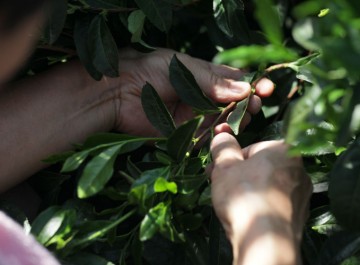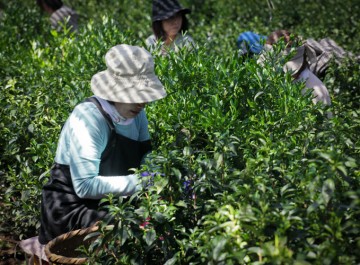At Matabay, although limited in supply, we offer organic tea picked in tea farms that are officially certified Organic by the Ministry of Agriculture, Forestry, and Fisheries of Japan.
The reason we mention a “limited” supply, is because there are very few tea farms/plantations in Uji that specialize in organic tea and can claim they make their tea without any chemical fertilizers or pesticides. Although Kagoshima and other regions of Japan have succeeded in making organic green tea that are of a good quality, making organic tea to this day is considered to be a big risk for the farmers, and less than 1% of the tea produced in Japan is fully organic.
The “risk” factor is two-fold. One is the financial risk that comes from the risk of not being able to make as much tea while the workload doubles and triples, but the even bigger is in risk in quality control. It is truly a challenge to be able to produce a tea that will stand a chance in the market flavor wise. While most farmers can get 2 to 4 harvests per year, in order to be able to ship a quality tea that meets the markets standards, an organic tea farmer would only be able to harvest once per season.
Another issue is the matter of space. To make fine tea, you need the perfect environment. With most of the tea farmers producing tea with the assistance of chemical fertilizers (an ammonium sulfate fertilizer, which is nitrogen-based and rapid-acting), it is necessary to create a “buffer zone” so that the organic tea farms are not affected by the chemicals used in other farms. Finding this space, in a limited area that is tightly packed with other tea farms, is a challenge to say the least. Upon the yearly inspection, if even a trace of pesticide or chemical fertilizer is found, it could mean loosing their government approval as an organic farm.
At the same time, non-organic farms do not like to be placed right next to an organic farm due to the fact that organic farms tend to attract bugs. More bugs means having to use more pesticide, and the non-organic farmers do not want to have to use more than the bare minimum, as it affects the taste of their tea and heightens the risk that their tea could potentially be labeled “unfit for market due to chemical residue”.
Although being able to make Organic tea is well respected by all, these challenges are why few farmers have opted to go fully organic.
So, now comes the question about our Non-Organic teas. Are they safe?
 Japan has tough laws concerning the Concentration Standard of Residual Agricultural Chemicals, and Uji tea meets the EU safety standards, the toughest safety standards in the world. Which means that all teas sold at Matabay, including the non-organic teas, can be exported to EU.
Japan has tough laws concerning the Concentration Standard of Residual Agricultural Chemicals, and Uji tea meets the EU safety standards, the toughest safety standards in the world. Which means that all teas sold at Matabay, including the non-organic teas, can be exported to EU.
The Positive System of Agricultural Chemicals in Japan also strictly regulates what types of pesticides can be used, how much can be used, and when they can be used. Farmers are bound by strict regulations to record what was used, when it was used, and how much used, and then submit the reports to the authorities.
Furthermore, the tealeaves are tested for chemical residue, and are not allowed in the market if they go even slightly above the safety standard.
One of the main reasons why farmers use the chemical fertilizers, especially for Matcha and Gyokuro, is that the organic fertilizers work slowly, and take anywhere from 3 to 9 months to take effect. On contrast, the chemical fertilizers work rapidly, allowing the “boost” that the plants need when they need it. So what most non-organic farmers do, is use a little of both. They start the year off with using organic fertilizers, and will turn to a minimal amount of non-organic fertilizers at the crucial moments when it is needed the most.
Once, a customer asked me, knowing that the tea made at the Matabay Matcha plantation is non-organic, if I would feel comfortable having my children drink the tea that I produce. My answer was yes, without any doubt, or any reservation. In fact, what our family makes is what they drink, and it has been this way for many generations.
Both organic teas, and non-organic teas sold at Matabay, have been made under strict governmental guidelines and regulations, and we can say with confidence that both are safe for consumption, and both are quite delicious and healthy.








